Joseph A. Beavo Jr., PhD
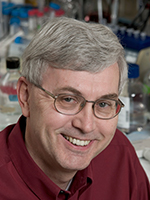 Joseph A. Beavo Jr. received his BS in Biology and Chemistry from Stetson University, and his PhD in Physiology from Vanderbilt University. He was a postdoctoral fellow at the University of California at Davis with Professor Edwin Krebs. Dr. Beavo
was appointed Assistant Professor of Pharmacology at the University of Washington in 1977 and is now Professor Emeritus of Pharmacology.
Joseph A. Beavo Jr. received his BS in Biology and Chemistry from Stetson University, and his PhD in Physiology from Vanderbilt University. He was a postdoctoral fellow at the University of California at Davis with Professor Edwin Krebs. Dr. Beavo
was appointed Assistant Professor of Pharmacology at the University of Washington in 1977 and is now Professor Emeritus of Pharmacology.
He is the world leader in studies of cyclic nucleotide phoshphdiesterases (PDEs), which hydrolyze cyclic AMP and cyclic GMP to terminate their signal transduction. He skillfully used novel monoclonal antibody approaches to dissect the PDE protein families
and establish their specificities for hydrolysis of cyclic AMP vs. cyclic GMP and their differential regulation by cyclic nucleotides and calcium. This work led directly to successful efforts at pharma companies to develop subtype-selective PDE inhibitors
as drugs, including PDE3 inhibitors for acute heart failure and sildenafil (Viagra), tadalafil (Cialis), and other PDE5 inhibitors for erectile dysfunction, benign prostatic hyperplasia, and pulmonary hypertension.
Dr. Beavo led the way in cloning cDNAs for many PDEs, thereby establishing molecular relationships among eleven families of PDEs, defining their diversity of form and function, and providing molecular reagents for the field. He discovered the structural
basis for regulation of PDEs through GAF domains in enzymes expressed from bacteria to man. Dr. Beavo’s work established key roles of PDEs in olfaction, vision, insulin secretion, smooth muscle proliferation, T cell and macrophage activation,
steroidogenesis in the adrenal cortex, and development of sperm in the testis. Dr. Beavo is widely considered the scientific father of the broad field of PDE research, and he has been recognized by election to the National Academy of Sciences and
by selection for the Julius Axelrod Award of ASPET.
He is a leader of international stature in ASPET and in pharmacology. He was associate editor of Molecular Pharmacology (1986-1990) and editorial board member of Pharmacological Reviews (1995-2000). He served as ASPET councilor (2000-2008),
president of ASPET (2008-2009), and has been a member of ASPET since 1981.
Dr. Beavo is an exceptional mentor of junior colleagues. His relationships with graduate students and postdoctoral fellows are personal and caring, in addition to having exceptional scientific depth. He has an exemplary record of research integrity and
communicates those deeply held values to his trainees. Many of his graduate students and postdoctoral fellows had highly successful careers in academia, pharma, and biotech industries. Dr. Beavo also served as Vice Chair of Pharmacology at University
of Washington, where his mentoring in grant-writing, research presentation, and teaching benefited multiple generations of junior faculty members.
Joan Heller Brown, PhD
 Joan Heller Brown graduated with honors from Cornell University and began her PhD training in the Department of Pharmacology at Albert Einstein College of Medicine (AECOM). Her first publication, demonstrating that the dopamine receptor couples to
adenylate cyclase and is the target of antipsychotic drugs, was communicated to the PNAS by her department chair, Dr. Alfred Gilman senior. After a postdoctoral fellowship with Perry Molinoff in the Department of Pharmacology at the U. of Colorado,
Dr Heller Brown moved to UCSD where she extended her studies on how G-protein coupled receptors (GPCRs) regulate cellular responses. Her work led to the discoveries that muscarinic GPCRs activate the G-protein, Gi , to inhibit adenylate cyclase, explaining
cholinergic/adrenergic antagonism in the heart; that GPCRs stimulate phospholipase C through the Gq protein and that this pathway regulates cardiac hypertrophy; and that activation of CaM kinase II plays a major role in development of heart failure
through its effects on calcium handling and cardiac inflammation. Another area of major interest has been in GPCRs that transduce signals through G12 to activate RhoA, including work showing that this signaling pathway contributes to neuroinflammation,
to cardioprotection and to YAP activation and aberrant glioma cancer cell growth. Dr Heller Brown noted recently that the Departments in which she trained were all chaired by individuals who had served as presidents of ASPET (Alfred Gilman, Norman
Weiner, Steve Mayer and Palmer Taylor). All of these individuals, in particular Palmer Taylor, provided strong support as she developed expertise and an identity in the field of Molecular Pharmacology.
Joan Heller Brown graduated with honors from Cornell University and began her PhD training in the Department of Pharmacology at Albert Einstein College of Medicine (AECOM). Her first publication, demonstrating that the dopamine receptor couples to
adenylate cyclase and is the target of antipsychotic drugs, was communicated to the PNAS by her department chair, Dr. Alfred Gilman senior. After a postdoctoral fellowship with Perry Molinoff in the Department of Pharmacology at the U. of Colorado,
Dr Heller Brown moved to UCSD where she extended her studies on how G-protein coupled receptors (GPCRs) regulate cellular responses. Her work led to the discoveries that muscarinic GPCRs activate the G-protein, Gi , to inhibit adenylate cyclase, explaining
cholinergic/adrenergic antagonism in the heart; that GPCRs stimulate phospholipase C through the Gq protein and that this pathway regulates cardiac hypertrophy; and that activation of CaM kinase II plays a major role in development of heart failure
through its effects on calcium handling and cardiac inflammation. Another area of major interest has been in GPCRs that transduce signals through G12 to activate RhoA, including work showing that this signaling pathway contributes to neuroinflammation,
to cardioprotection and to YAP activation and aberrant glioma cancer cell growth. Dr Heller Brown noted recently that the Departments in which she trained were all chaired by individuals who had served as presidents of ASPET (Alfred Gilman, Norman
Weiner, Steve Mayer and Palmer Taylor). All of these individuals, in particular Palmer Taylor, provided strong support as she developed expertise and an identity in the field of Molecular Pharmacology.
Dr Heller Brown’s research has been consistently funded by the NIH, with grants from GM, NHLBI and the NCI. Her work has been published in 250 peer reviewed papers in high impact and specialty journals. She has authored chapters on cholinergic receptors
in seven editions (1990-present) of Goodman and Gilman’s The Pharmacological Basis of Therapeutics, served on multiple editorial boards, five currently, and was Editor- in- Chief of the ASPET journal Molecular Pharmacology.
While emphasizing pharmacology, her scholarly work incorporates multiple disciplines including cell and molecular biology, cardiovascular physiology, neuroscience and cancer biology. Dr Heller Brown has served as chair of UCSD’s Department of
Pharmacology since 2002 during which time the faculty, grant funding, and national and international reputation have grown substantially. She directed the UCSD Biomedical Sciences Graduate Program and has been PI of the oldest and largest NIH T32
training grant in Pharmacological Sciences since 2008. Individually she has mentored more than 50 pre- and postdoctoral trainees, and has directed and taught in multiple graduate and medical school courses. Her honors include receipt of the first
Distinguished PhD Alumna Award from AECOM, the Lucchesi Distinguished Lectureship in Cardiac Pharmacology from ASPET, the AHA Basic Cardiovascular Sciences Distinguished Achievement Award, the PhRMA Award in Excellence and the ASPET Robert Ruffolo Career Achievement Award. In 2020 she was honored
by selection for an AHA Distinguished Scientist Award.
Marc G. Caron, PhD
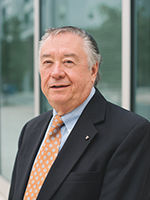 Marc G. Caron is James B. Duke Professor of Cell Biology at Duke University. Following his undergraduate education at Laval University in Quebec City, he obtained his PhD from the University of Miami. His contributions to the field of G protein-coupled
receptor (GPCR) biology and pharmacology span more than four and half decades. As a postdoctoral fellow and junior faculty at Duke University in the 1970s, he was involved in the development of radioligands to characterize beta-adrenergic (βAR)
and dopamine receptors (DAR). Concomitantly, he spearheaded the development of techniques to solubilize these membranes associated GPCRs, developed approaches to purify them by affinity chromatography, and developed receptor selective affinity and
photo-affinity probes for visualization of βARs. These advances eventually led to the sequencing and cloning of the first GPCR, the β2AR, and revealed its relation with visual rhodopsin. This work facilitated the cloning of many other GPCRs
based on sequence homology.
Marc G. Caron is James B. Duke Professor of Cell Biology at Duke University. Following his undergraduate education at Laval University in Quebec City, he obtained his PhD from the University of Miami. His contributions to the field of G protein-coupled
receptor (GPCR) biology and pharmacology span more than four and half decades. As a postdoctoral fellow and junior faculty at Duke University in the 1970s, he was involved in the development of radioligands to characterize beta-adrenergic (βAR)
and dopamine receptors (DAR). Concomitantly, he spearheaded the development of techniques to solubilize these membranes associated GPCRs, developed approaches to purify them by affinity chromatography, and developed receptor selective affinity and
photo-affinity probes for visualization of βARs. These advances eventually led to the sequencing and cloning of the first GPCR, the β2AR, and revealed its relation with visual rhodopsin. This work facilitated the cloning of many other GPCRs
based on sequence homology.
The identification of GPCRs and characterization of their signaling in cells led to the discovery of accessory proteins including the β-arrestins and GPCR selective kinases responsible for modulating receptor function. In the late 90’s, work
from the Caron laboratory provided some of the first direct functional evidence that the molecular machinery that had been associated with the desensitization of GPCR signals engage G protein-independent but β-arrestin-dependent signaling pathways
in cells.
For the past decade, the Caron lab has focused its efforts on understanding how the concept of functional selectivity/biased signaling of GPCRs can be used to provide better modalities to treat disorders like addiction, schizophrenia, Parkinson’s
disease and depression. Recently, the lab has developed a biased allosteric modulator of the neurotensin receptor 1 (NTSR1) which confers full β-arrestin agonism to NTSR1 while blocking NTSR1-G-protein signaling. Physiologically, this compound
blocks the rewarding effects of cocaine and amphetamine without eliciting the adverse side effects mediated by NTSR1-G-protein signaling.
During his career, Dr. Caron has been an outstanding mentor and advocate for over 125 junior scientists who trained in his laboratory at Duke University.
Dr. Caron has been a member of ASPET since 1980 and his work has been recognized by several awards from ASPET, Julius Axelrod Medal (2005), Ray Fuller Lecture in the Neurosciences (2007), The Goodman & Gilman Award in Receptor Pharmacology (2018).
From 1992 to 2005, he was an Investigator of the Howard Hughes Medical Institute. He also received a Javits Neuroscience Investigator MERIT Award (1991-1998) and a MERIT Award from National Institutes Mental Health (2010-2020) as well as the Lieber
Prize for Schizophrenia Research from the Brain and Behavior Research Foundation (2013). He has served on the scientific board of the Osaka Bioscience Institute (2010-2015) and the International Advisory Committee, Centre de Recherche du Centre Hospitalier
de l’Université de Montréal (CRCHUM) (2015-2020). In 2008, he received a Doctorate Honoris Causa, from the University of Montréal. He is also a member of the American Association for the Advancement of Science and the American
Academy of Arts and Sciences.
Brian Cox, PhD
 Brian Cox is currently Professor Emeritus of Pharmacology (previously Professor of Pharmacology & Neuroscience) at the Uniformed Services University (USU) in Bethesda, MD. He received his undergraduate training in pharmacology from Chelsea College,
London, UK, and received a PhD in Pharmacology from St. Mary's Hospital Medical School, University of London, UK. After serving as Lecturer in Pharmacology (British system) at Chelsea College, Dr. Cox took up a research scientist position and later
served as Research Director at the Addiction Research Foundation, with an adjunct associate professorship in the Department of Pharmacology, at Stanford University CA. In 1981, Dr. Cox moved to his current position at USU, where he served as
chair of the Department of Pharmacology from 1995 until 2007. He was the first Director of the USU Interdisciplinary Graduate Program in Neuroscience, served as Assistant Dean for Graduate Education at USU from 2015-2019, and chaired the USU Institutional
Animal Care and Use Committee from 2005 to 2019. He received the Carol Johns Award at USU in 2009.
Brian Cox is currently Professor Emeritus of Pharmacology (previously Professor of Pharmacology & Neuroscience) at the Uniformed Services University (USU) in Bethesda, MD. He received his undergraduate training in pharmacology from Chelsea College,
London, UK, and received a PhD in Pharmacology from St. Mary's Hospital Medical School, University of London, UK. After serving as Lecturer in Pharmacology (British system) at Chelsea College, Dr. Cox took up a research scientist position and later
served as Research Director at the Addiction Research Foundation, with an adjunct associate professorship in the Department of Pharmacology, at Stanford University CA. In 1981, Dr. Cox moved to his current position at USU, where he served as
chair of the Department of Pharmacology from 1995 until 2007. He was the first Director of the USU Interdisciplinary Graduate Program in Neuroscience, served as Assistant Dean for Graduate Education at USU from 2015-2019, and chaired the USU Institutional
Animal Care and Use Committee from 2005 to 2019. He received the Carol Johns Award at USU in 2009.
For most of his career Dr. Cox's research has focused on characterizing receptors utilized by opiate drugs and their endogenous ligands, on defining potential physiological and pathophysiological roles for endogenous opioids and other neuropeptides, and
on understanding mechanisms underlying drug tolerance and dependence. In recent years, his lab studied factors affecting peptide and receptor expression, and changes at the cellular level induced by drugs of abuse, severe stress, or neural injury;
he now continues to collaborate with Dr. Fereshteh Nugent in the Department of Pharmacology at USU. He chaired the Biomarkers Group of the USU/NIH Center for Neuroscience and Regenerative Medicine for 10 years until 2020, establishing a neurotrauma
biospecimen repository and evaluating neurochemical mechanisms and potential biomarkers for TBI.
Dr. Cox has been a member of ASPET since 1976. He served as secretary/treasurer from 1997-2000 and was elected president of ASPET for 2009-2010. He chaired the ASPET Board of Publications Trustees from 2002-2007, also serving on the editorial boards
of the Journal of Pharmacology and Experimental Therapeutics from 1998-2016, Molecular Pharmacology from 1981-1994, and Molecular Interventions from 2000-2002. Dr. Cox was a member of the ASPET Scientific Program
Committee from 1986-1990, chairing the committee from 1990-1996. He served as ASPET’s representative to the Experimental Biology Program Committee from 1991-1994 and on the Experimental Biology Board from 1996-1999 (as Chairman from 1998-1999).
He represented ASPET on the Board of Directors of the Federation of American Societies of Experimental Biology (FASEB) from 2011-2019.
Dr. Cox chaired the IUPHAR World Congress of Pharmacology Scientific Program Committee for the 2002 San Francisco meeting of IUPHAR which was managed by ASPET. He also served as President of the International Narcotics Research Conference from 1994-1998,
co-organizing meetings in Scotland (St. Andrews), Long Beach, CA (on the Queen Mary) and Hong Kong (in 1997). He is also a member of the British Pharmacological Society, the Society for Neuroscience, the American Association for the Advancement
of Science, and the American Society for Neurochemistry.
William L. Dewey, PhD
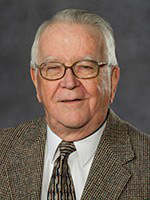 Bill Dewey earned his doctoral degree in Pharmacology from the University of Connecticut in 1967. He served as a postdoc and a junior faculty member at The University of North Carolina until 1972, when he became an associate professor at the Medical
College of Virginia, now Virginia Commonwealth University. He served as associate dean, dean of the college, assistant dean and vice president for research and graduate studies. He was the executive director of the Virginia Biotechnology Research
Park and was awarded the Lifetime Achievement Award for excellence in science by The Commonwealth of Virginia. He received the University Award of Excellence for Teaching, Research and Service in 1983 and The President’s Medallion for
outstanding contributions to the university in 2012. Bill is the current chair of Pharmacology and Toxicology at VCU.
Bill Dewey earned his doctoral degree in Pharmacology from the University of Connecticut in 1967. He served as a postdoc and a junior faculty member at The University of North Carolina until 1972, when he became an associate professor at the Medical
College of Virginia, now Virginia Commonwealth University. He served as associate dean, dean of the college, assistant dean and vice president for research and graduate studies. He was the executive director of the Virginia Biotechnology Research
Park and was awarded the Lifetime Achievement Award for excellence in science by The Commonwealth of Virginia. He received the University Award of Excellence for Teaching, Research and Service in 1983 and The President’s Medallion for
outstanding contributions to the university in 2012. Bill is the current chair of Pharmacology and Toxicology at VCU.
Bill served as the chairman of The ASPET Program Committee for more than a decade and chair of the FASEB Program Committee. Bill was an associate editor of JPET and served on many other committees and currently is a member of the public affairs committee.
He was elected secretary-treasurer and then president of ASPET. Bill chaired the ASPET Centennial Committee and edited its compendium. He served as President of FASEB and chaired the 1990 Williamsburg Retreat which led to the rewriting
of its By-laws, Constitution and Articles of Incorporation. He was highly honored to receive The Torald Sollmann Award for excellence in teaching, research and service from ASPET. Bill was Chairman of the Board for the College on Problems of Drug
Dependence (CPDD) for two years and served as their public policy officer for over 20 years. He received the Nathan B. Eddy award for lifetime achievement in drug abuse research from CPDD. He formed The Friends of NIDA, a coalition of
over 100 scholarly organizations, with the goal to encourage congress to increase funding for biomedical and especially drug abuse research. This organization has conducted 25 briefings on Capitol Hill and its board of former congress members
and directors of NIH Institutes provides leadership and guidance. Bill was honored to receive the Distinguished Service Award from NIDA.
He has been the P.I. of a NIH T32 training grant for 45 consecutive years, as well as two other training grants from other institutes and has mentored over 20 doctoral students and over 50 postdocs. He and his colleagues elucidated the pharmacological
characteristics of cannabinoids and showed that a marked central nervous system tolerance developed to their chronic administration. Bill and his colleague, Dr. Edwin Myer a pediatric neurologist, discovered the role of endogenous opioids in
sudden infant death syndrome and the treatment of this disease with Naltrexone. Further they proposed the hypothesis that abnormal endogenous opioids lead to other diseases characterized by centrally induced respiratory depression. The concentration
of his research now is directed toward elucidating the mechanisms responsible for the differing rates of tolerance to various effects of chronic opioids in spite of the prevailing evidence that all these effects are mediated by the same type receptor.
Raymond J. Dingledine, PhD
 Raymond Dingledine received a PhD in pharmacology under Avram Goldstein at Stanford in 1975. He received postdoctoral training from Leslie Iversen and John Kelly at Cambridge, UK (1975-77), then Per Andersen at Oslo (1977-78). He joined the Department
of Pharmacology at the University of North Carolina at Chapel Hill in 1978, rising to professor, with a sabbatical year in Steve Heinemann’s lab at the Salk Institute 1990-1991. Dr. Dingledine moved to Emory University in 1992 as chair of pharmacology,
a position he held until 2017. At Emory he developed a strong department focused on cellular and molecular mechanisms of drug action.
Raymond Dingledine received a PhD in pharmacology under Avram Goldstein at Stanford in 1975. He received postdoctoral training from Leslie Iversen and John Kelly at Cambridge, UK (1975-77), then Per Andersen at Oslo (1977-78). He joined the Department
of Pharmacology at the University of North Carolina at Chapel Hill in 1978, rising to professor, with a sabbatical year in Steve Heinemann’s lab at the Salk Institute 1990-1991. Dr. Dingledine moved to Emory University in 1992 as chair of pharmacology,
a position he held until 2017. At Emory he developed a strong department focused on cellular and molecular mechanisms of drug action.
With continuous NIH funding since 1978, his research on the pharmacology of glutamate receptors and causes of epilepsy embraces many technical and conceptual approaches. He was an early adopter of the hippocampal slice preparation for electrophysiological
studies of synaptic integration, introduced the Xenopus oocyte system for quantitative glutamate receptor pharmacology, and adapted molecular biology techniques to investigate transcriptional, epigenetic and translational regulatory mechanisms of
glutamate receptor expression. Dr. Dingledine coined the term “coagonist” to describe the obligatory role of glycine in NMDA receptor activation. His group revealed multiple mechanisms by which the properties of postsynaptic glutamate
receptors are regulated. These mechanisms are transcriptional, involving a seizure-activated silencer in the GluR2 promoter; translational, involving a polymorphic repeat in the 5’UTR; and allosteric, involving numerous endogenous modulators
including protons and zinc. His current research focuses on the consequences of unabated inflammation in the brain on synaptic functions and memory-like behaviors. He and his colleagues demonstrated a profound role for EP2 receptor activation in cyclooxygenase-2
related pathologies, highlighting the importance of neuroinflammation in epilepsy and many other disorders.
Dr. Dingledine co-founded two start-up pharma companies to address unmet clinical needs: Neurop Inc, a clinical stage company developing NMDA receptor antagonists for cerebral ischemia, and Pyrefin Inc, which is developing EP2-related anti-inflammatory
agents.
National service to the neuroscience and pharmacology communities has been important to him, and thus he has served in numerous local and national leadership positions. He has been a member of ASPET since 1982. He served as editor of Molecular Pharmacology from 1995-2000, as a member of the ASPET Nominating Committee (1998-1999), as chair of the ASPET Epilepsy Awards Committee 2000-2002, and as chair of the Division for Molecular Pharmacology in 2003. In 1991 he received the ASPET Epilepsy Research
Award, in 1999 he received the PhRMA Foundation Pharmacology/Morphology Career Award in Excellence, and in 2018 the ASPET Robert R Ruffolo Career Achievement Award. He was elected into the National Academy of Medicine in 2010, and the Norwegian Academy
of Science and Letters in 2018.
Training the next generation has been important to him. Dr. Dingledine was the founding director of the T32 pharmacological sciences graduate training program at Emory, and he has supervised the research training of 13 PhD students and 47 postdoctoral
fellows, most of whom have gone on to productive scientific or science-related careers. These continuing relationships with colleagues are among his most treasured.
Margarita L. Dubocovich, PhD
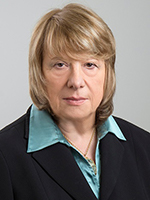 Margarita L. Dubocovich is Professor Emerita of Pharmacology, Northwestern University Feinberg School of Medicine, and is currently SUNY Distinguished Professor of Pharmacology & Toxicology at the University at Buffalo Jacobs School of Medicine
and Biomedical Sciences. She received her PhD in Pharmacology, School of Chemistry and Natural Sciences, Buenos Aires University, Argentina.
Margarita L. Dubocovich is Professor Emerita of Pharmacology, Northwestern University Feinberg School of Medicine, and is currently SUNY Distinguished Professor of Pharmacology & Toxicology at the University at Buffalo Jacobs School of Medicine
and Biomedical Sciences. She received her PhD in Pharmacology, School of Chemistry and Natural Sciences, Buenos Aires University, Argentina.
Dr. Dubocovich, a career pharmacologist, joined ASPET in 1983. She has published more than 400 scientific articles, reviews, book chapters and abstracts on the neuropharmacology of presynaptic monoamine and melatonin receptors. A world leader in melatonin
receptor pharmacology, she discovered prototype MT1- and MT2-selective melatonin receptor agonists, antagonists, and inverse agonist that has guided the field in the search for functional melatonin receptor responses. Her findings are key to our understanding
on the role of melatonin receptors in circadian rhythms, sleep disorders, depression, and even cardiovascular disorders and cancer.
Dr. Dubocovich’s numerous honors and awards are testament to her outstanding contributions to the field of pharmacology and include, among others, the 2012 PhRMA Foundation Award for Excellence in Pharmacology and Toxicology and being named a Fellow
of the American College of Neuropsychopharmacology in 2013. Dr. Dubocovich is a master educator and mentor. She served as an ASPET Executive Committee member on the Division of Pharmacology Education and organized and co-chaired several minisymposia.
She has led programs to enrich the preparation of students and postdocs for careers in pharmacology. She founded the nationally recognized Collaborative Learning and Integrated Mentoring in the Bioscience (CLIMB) Program to enhance student success,
excellence in education and to increase diversity among STEM graduate and professional students, fellows and faculty by providing mentoring and career and professional development. Her tireless devotion on achieving inclusive excellence through diversity
and inclusion among learners is recognized by all who know her and is exemplified by her current role as Senior Associate Dean for Diversity and Inclusion.
In recognition of her efforts, she received the 2011 Distinguished Postdoctoral Mentor Award, the 2016 Excellence in Graduate Student Mentoring Award, the 2017 CSTEP Outstanding Research Mentor Award, and the 2017 American College of Neuropsychopharmacology
Dolores Shockley Minority Award for Excellence in Mentoring, among others. Dr. Dubocovich has provided consistent leadership to the field of pharmacology in many roles.
ASPET has been particularly fortunate to benefit from her service to the Executive Committee and as secretary-treasurer of the Division for Neuropharmacology (2007-2010), as organizer and co-chair of symposia, as member and chair of the ASPET Committee
on Diversity (2005-2006), and as a member of the Committee on Women in Pharmacology (2002-2010), and the Mentoring and Career Development Committees (2017), and the Global Partnerships Task Force, among others. Dr. Dubocovich was a councilor of the
ASPET Great Lakes Chapter and founded and served as president of the Upstate New York Pharmacology Society (ASPET Chapter). She was a member of the International Advisory Board and Organizing Committees of the International Union of Pharmacology (IUPHAR)
satellite symposia on presynaptic (1978, 1990) and serotonin (1994) receptors, chair (1995-2015) and member (2015-present) of the (IUPHAR) Subcommittee for Melatonin Receptor Nomenclature and Classification.
Lorraine J. Gudas, PhD
 Lorraine J. Gudas is Chairman and Revlon Pharmaceutical Professor of Pharmacology and Toxicology of the Pharmacology Department of Weill Cornell Medicine in New York City. Dr. Gudas is the first woman to chair a basic
science department at Weill Cornell.
Lorraine J. Gudas is Chairman and Revlon Pharmaceutical Professor of Pharmacology and Toxicology of the Pharmacology Department of Weill Cornell Medicine in New York City. Dr. Gudas is the first woman to chair a basic
science department at Weill Cornell.
A member of ASPET since 1991, she has served on the Membership Advisory Committee and the Board of Publications Trustees from 2004-2011. In 2019, Dr. Gudas was elected by ASPET and the Japanese Pharmacological Society to be a Keynote Speaker at the annual
meeting in Osaka, Japan. She also served a term as a member of the Board of Directors of the American Association of Cancer Research, the largest organization of cancer researchers in the US. Dr. Gudas chaired the Board of Scientific Counselors of
the National Institute of Diabetes and Digestive and Kidney Disorders. She also chaired the National Heart, Lung, and Blood Institute Board of Scientific Counselors. She is currently on the Board of Scientific Advisors of the Waxman Cancer Research
Foundation and is a member of the Scientific Advisory Board of the Lineberger Cancer Center.
In 1999, she received the 2nd Annual "Women in Cancer Research" award from the American Association of Cancer Research. In 2008, Dr. Gudas was elected a Fellow of the American Association for the Advancement of Science. She has had a long-standing research
interest in vitamin A and its derivatives and metabolites, a group of compounds called retinoids. She and her laboratory have studied the pharmacology and molecular actions of retinoids, including the epigenetic changes that occur during cell differentiation
induced by retinoids. Recently, in a mouse model they have shown that vitamin A deficiency results in diabetes.
Dr. Gudas also carries out research on the therapeutic uses of stem cells, and mouse models of head and neck and kidney cancer. While working as a PhD student at Princeton University, Dr. Gudas analyzed the ‘SOS’ DNA repair process and identified
the key protein in this pathway, the RecA protein. She showed that the RecA protein was induced by 40-50 fold upon DNA damage to bacteria, a major finding in the field that led to a more mechanistic understanding of the proteins involved in DNA repair.
Dr. Gudas was the first to clone the genes for the important extracellular matrix proteins collagen IV and laminin. Dr. Gudas was then the first to identify a primary target gene of the retinoic acid (a key vitamin A metabolite) signaling pathway,
ERA-1/Hoxa1.
Her laboratory also identified key DNA sequences by which the ligand, retinoic acid, and its receptor, RAR, bound to DNA to transcriptionally activate ERA-1/Hoxa1. She and her colleagues identified and characterized a gene called REX-1 (Zfp-42)
that was highly expressed in embryonic stem cells. REX-1 was later shown to be a key gene that marks ‘stemness’ in embryonic stem cells. This body of work by Dr. Gudas identified a series of genes that were key to cell differentiation
and linked these genes to important signaling pathways for differentiation, development, and cancer.
Susan Band Horwitz, PhD
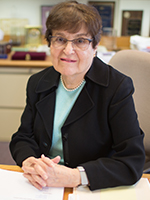 Susan Band Horwitz is a Distinguished Professor and the Rose C. Falkenstein Professor of Cancer Research in the Department of Molecular Pharmacology at Albert Einstein College of Medicine. She received her undergraduate degree from Bryn Mawr College
and a PhD in biochemistry from Brandeis University. While raising twin sons, Dr. Horwitz worked part-time in the Departments of Pharmacology at Tufts University Medical School, Emory University College of Medicine, and Albert Einstein College of Medicine
before assuming a full-time faculty position at Albert Einstein where she rose to full professor and served as co-chair of the Department of Molecular Pharmacology for 30 years.
Susan Band Horwitz is a Distinguished Professor and the Rose C. Falkenstein Professor of Cancer Research in the Department of Molecular Pharmacology at Albert Einstein College of Medicine. She received her undergraduate degree from Bryn Mawr College
and a PhD in biochemistry from Brandeis University. While raising twin sons, Dr. Horwitz worked part-time in the Departments of Pharmacology at Tufts University Medical School, Emory University College of Medicine, and Albert Einstein College of Medicine
before assuming a full-time faculty position at Albert Einstein where she rose to full professor and served as co-chair of the Department of Molecular Pharmacology for 30 years.
Dr. Horwitz has published 300 scientific articles, book chapters, and reviews in the area of experimental therapeutics of cancer. Her work has made seminal contributions to the understanding of the targets and the mechanisms of action/resistance of natural
product anticancer agents. In particular, Dr. Horwitz is recognized worldwide for her pioneering work elucidating the mechanism of action of the natural product Taxol (generic name, paclitaxel), which disrupts microtubule dynamics by stimulating tubulin
polymerization and stabilizing microtubules. Her discoveries contributed significantly to the clinical development of Taxol used for treatment of a variety of malignancies. Her lab has provided equally seminal work on the mechanisms of action of important
anticancer agents such as bleomycin, etoposide, and camptothecin.
In addition to her significant research achievements, Dr. Horwitz has mentored more than 50 pre- and post-doctoral trainees and early stage faculty, many of whom are now leaders in pharmacology and oncology. She has been a role model and a strong advocate
for women in science through her multiple leadership roles in scientific societies such as the American Association for Cancer Research (AACR) where she served as President (2002-2003).
A decades long member of ASPET, Dr. Horwitz served for seven years on the editorial board of Molecular Pharmacology, received the 1994 Pharmacia-ASPET Award in Experimental Therapeutics and was selected to speak at the ASPET Presidential Symposium
at the 2018 annual meeting. Dr. Horwitz is a member of the National Academy of Sciences, the National Academy of Medicine, the American Academy of Arts and Sciences and the American Philosophical Society. She has been recognized by dozens
of additional honors, most recently the Canada Gairdner International Prize (2019) and the Szent-Györgyi Prize for Progress in Cancer Research (2020).
Lori L. Isom, PhD
 Lori Isom is Maurice H. Seevers Professor and Chair of Pharmacology at the University of Michigan. She received her AB in Chemistry and Biology at Washington University in St. Louis and her PhD in Pharmacology at Vanderbilt University. She was a
postdoctoral fellow and research faculty member with Professor William Catterall, Department of Pharmacology, the University of Washington in Seattle.
Lori Isom is Maurice H. Seevers Professor and Chair of Pharmacology at the University of Michigan. She received her AB in Chemistry and Biology at Washington University in St. Louis and her PhD in Pharmacology at Vanderbilt University. She was a
postdoctoral fellow and research faculty member with Professor William Catterall, Department of Pharmacology, the University of Washington in Seattle.
Dr. Isom’s research focuses on voltage-gated sodium channels, which initiate action potentials in excitable cells. Sodium channels are complexes of a large pore-forming α (alpha) subunit plus one or two smaller non-pore-forming ß (beta)
subunits. Isom is the leading investigator worldwide on sodium channel ß subunits. Dr. Isom’s postdoctoral research included the first cloning, sequencing, and expression of voltage-gated sodium channel SCN1B and SCN2B,
encoding b1 and b2 subunits, respectively. Dr. Isom’s laboratory at the University of Michigan focuses on voltage-gated sodium channel structure, function, and role in developmental and epileptic encephalopathy (DEE), including Dravet syndrome.
Dr. Isom reported the first variant in SCN1B linked to DEE. Her lab investigates SCN1A, SCN1B, and SCN8A DEE variants in mouse models and human induced pluripotent stem cell (iPSC) neurons and cardiac myocytes.
Dr. Isom showed, in collaboration with Dr. Jack Parent, that the high risk of SUDEP in Dravet syndrome may result from a predisposition to cardiac arrhythmias in addition to neuronal hyperexcitability, reflecting haploinsufficiency of SCN1A in heart and brain and the resulting compensatory overexpression of other sodium channel genes in those tissues. Their work predicted cardiac abnormalities in a Dravet syndrome patient prior to clinical evaluation. Most recently, she has collaborated
with Stoke Therapeutics to develop the first antisense oligonucleotide therapeutic agent for Dravet syndrome. Altogether, Isom’s work has made her an international leader in ion channel research. Dr. Isom is a Co-PI of a NIH-funded Center Without
Walls U grant award. In addition to her research activities, she co-chairs the Dravet Syndrome Foundation Scientific Advisory Board, serves on the Board of the American Epilepsy Society, and chairs the NIH ESTA study section. She has received
awards for research and mentoring, including a NINDS Javits R37 MERIT award and the University of Michigan Rackham Distinguished Graduate Mentoring Award. In 2011, she was elected a Fellow of the American Association for the Advancement of Science
for her work in Neuroscience and Graduate Education.
Isom is a leading advocate for women and underrepresented minorities in science. She participated extensively in the AAMC Program for Mid-Career Women in biomedical science, and she led multiple Women-in-Science Career Panels. She has participated in
the annual GREAT and Annual Biomedical Research Conference for Minority Students meetings that introduce under-represented minority students to research and graduate training in biomedical science. Dr. Isom served as Associate Editor of Pharmacological Reviews,
ASPET’s world-leading review journal. She has made a major impact on pharmacology at the University of Michigan. She serves as PI of the NIH funded, Pharmacological Sciences Training Program T32 grant. She was a founding member of the innovative
Program in Biomedical Sciences (PIBS) at Michigan, which is the entry point for all graduate students into basic science departments. As Director of PIBS, she made innovations that greatly increased recruitment of under-represented minority students
and substantially enhanced the educational experience for first-year graduate students. In recognition of her huge impact on research and graduate education at Michigan, she was appointed Assistant Dean for Graduate Education. She has been a member
of ASPET since 1998.
Eric F. Johnson, PhD
 Eric F. Johnson received a BS degree in Chemistry from the University of Texas at Austin in 1967 and PhD degree in Chemistry from the University of Illinois at Urbana-Champaign in 1972. He joined The Scripps Research Institute, La Jolla, California, USA in 1973, where he is currently a Professor in the Department of Experimental Medicine.
Eric F. Johnson received a BS degree in Chemistry from the University of Texas at Austin in 1967 and PhD degree in Chemistry from the University of Illinois at Urbana-Champaign in 1972. He joined The Scripps Research Institute, La Jolla, California, USA in 1973, where he is currently a Professor in the Department of Experimental Medicine.
Dr. Johnson has spent much of his research career studying the structure, function and regulation of mammalian cytochrome P450 monooxygenases. His work has contributed to our current understanding of P450 diversity within species, of mechanisms underlying the induction of P450s by xenobiotics and of the activation of P450 metabolism by alternative substrates and other effectors. In addition, he and his colleagues determined the first structure of a membrane P450 by X-ray crystallography, and his current work continues to address the structure, regulation and function of P450 enzymes. These accomplishments reflect contributions from the talented postdoctoral fellows and visiting scientists who he has mentored.
Dr. Johnson is a recipient of the Bernard B. Brodie Award in Drug Metabolism from the American Society for Pharmacology and Experimental Therapeutics and the North American Region Scientific Achievement Award in honor of Ronald W. Estabrook from the International Society for the Study of Xenobiotics.
Dr. Johnson is member of the editorial board of Molecular Pharmacology and served as Editor-in-Chief of Drug Metabolism and Distribution. He is also a member of the editorial board of the Journal of Biological Chemistry and served on the board of reviewing editors for Science and the editorial board Archives of Biochemistry and Biophysics. Additionally, Dr. Johnson and Dr. Michael Waterman co-edited three volumes of Methods in Enzymology.
Curtis D. Klaassen, PhD
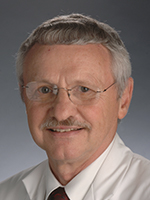 Curtis D. Klaassen earned his MS and PhD in Pharmacology at the University of Iowa under the mentorship of Gabriel L. Plaa. Klaassen then joined the Department of Pharmacology, Toxicology, and Therapeutics at the University of Kansas Medical Center
in Kansas City, Kansas, where he spent his entire 45-year academic career. He became a university distinguished professor as well as chair of the department.
Curtis D. Klaassen earned his MS and PhD in Pharmacology at the University of Iowa under the mentorship of Gabriel L. Plaa. Klaassen then joined the Department of Pharmacology, Toxicology, and Therapeutics at the University of Kansas Medical Center
in Kansas City, Kansas, where he spent his entire 45-year academic career. He became a university distinguished professor as well as chair of the department.
Klaassen’s research interests centered on the liver. He championed the concept that drugs might enable an organ to work better than normal. He refers to this as “reprogramming the liver.” His research on hepatic transporters, metallothionein,
and Nrf2 activators proved his hypothesis. To fund this research, he averaged three NIH-RO1 grants per year over the 45 years. He published more than 600 manuscripts and 90 review articles and chapters for books.
Numerous times, Klaassen’s research has been noted to be extremely influential. In 1992, Eugene Garfield in Current Contents indicated that Klaassen had the fourth-highest scientific impact in the United States in the study of xenobiotics. In 2002,
The Institute for Scientific Information indicated he was a “Highly Cited Researcher in Pharmacology,” a designation that a mere one-half of one percent of all researchers receive. In 2007, In-Cites distinguished Klaassen as a “Most-Cited
Researcher in Pharmacology and Toxicology” over the past 10 years and ranks as the seventh most-cited researcher in Pharmacology and Toxicology in the world.
Klaassen taught medical, nursing, and graduate students and received the W.T. Kemper Fellow Award, the highest teaching award given by the University of Kansas. By authoring four editions of the toxicology section of Goodman and Gilman’s The Pharmacological Basis of Therapeutics from 1980 to 2005, he markedly changed the toxicology material that medical students are taught around the world. He has also edited the last eight editions of Casarett and Doull’s Toxicology: The Basic Science of Poisons.
Klaassen is most proud of the 120 PhD and postdoctoral students he mentored. After leaving his laboratory, his students have excelled in academic, industrial, and governmental positions. So far, five have received achievement awards and three have been
elected president of the Society of Toxicology. He served on more than one hundred national and international Committees including the Environmental Protection Agency, the National Institutes of Health, the International Agency for Research on Cancer,
the National Library of Medicine, the Food and Drug Administration, the Occupational Safety and Health Administration, the World Health Organization, the Agency for Toxic Substances and Disease Registry, the International Council for Science, etc.
He was associate editor of the Journal of Pharmacology and Experimental Therapeutics for 24 years and Toxicology and Applied Pharmacology for ten years. He was the inaugural editor-in-chief of Toxicological Sciences, which
rapidly became the number one toxicology journal in the world. He also was elected president of the Society of Toxicology as well as the president of the International Union of Toxicology. Klassen has been a member of ASPET since 1970.
John D. Scott, PhD
 John Scott received his BS in Biochemistry from Heriot-Watt University in Edinburgh, Scotland and his PhD in Biochemistry from the University of Aberdeen. He was a postdoctoral fellow with Nobel laureates Edwin G. Krebs and Edmond H. Fischer. He
is currently the Edwin G. Krebs-Speights professor of cell signaling and cancer biology and chair of the Department of Pharmacology at the University of Washington in Seattle.
John Scott received his BS in Biochemistry from Heriot-Watt University in Edinburgh, Scotland and his PhD in Biochemistry from the University of Aberdeen. He was a postdoctoral fellow with Nobel laureates Edwin G. Krebs and Edmond H. Fischer. He
is currently the Edwin G. Krebs-Speights professor of cell signaling and cancer biology and chair of the Department of Pharmacology at the University of Washington in Seattle.
Dr. Scott’s work has revolutionized our understanding of signal transduction by cAMP and other second messengers. He discovered the large family of A-kinase anchoring proteins (AKAPs) that target cAMP-dependent protein kinase (PKA) and other signaling
enzymes to subcellular sites in proximity to effectors and substrates. AKAPs form multivalent signaling complexes by associating with protein kinases, phosphatases, adenylyl cyclases, and phosphodiesterases. These AKAP signaling complexes integrate
second messenger-mediated signals and direct them toward substrates.
Recently, Dr. Scott’s group revealed that PKA bound to AKAPs can be activated by cAMP without dissociation of the catalytic subunit from the regulatory subunit; a dogma-challenging discovery which has revolutionized the concept of local control
of cAMP signaling. The biological relevance of this work is underscored by Dr. Scott’s functional studies demonstrating the requirement for kinase anchoring in rapid cAMP-dependent regulation of receptors, ion channels, and transporters that
play key roles in complex physiological processes, such as insulin secretion, synaptic transmission, cardiac excitation-contraction-coupling and cell movement. His work established a new paradigm for the systems biology of cell-signaling in space
and time.
John Scott’s research has been recognized by many awards, including the John Jacob Abel Award from ASPET in 1996 and the Ernst Oppenheimer Award from the Endocrine Society and the Ariëns Award from the Dutch Pharmacological Society. He was
a Howard Hughes Investigator for over 20 year and has been elected into several prestigious societies, including the Royal Society London, the Royal Society of Edinburgh, and as a foreign member of the Norwegian Academy of Sciences.
Dr. Scott has a strong record of service to ASPET and other societies by serving on committees, councils, editorial boards, and organizing numerous conferences, including FASEB Scientific Research Conferences and Gordon Research Conferences. He has been
a member of ASPET since 1997.
Dr. Scott has been an active mentor for junior faculty colleagues, graduate students, and postdoctoral fellows, first at the Vollum Institute in Portland Oregon and since 2016 as Chair of the Department of Pharmacology at the University of Washington.
As chair, he has been especially concerned and effective with mentoring women and under-represented minority faculty members. In addition, Dr. Scott has an exemplary track record of mentoring junior scientists in his own laboratory, many who have
gone on to establish successful research programs and to serve in academic leadership positions around the world.
Accordingly, Dr. Scott was recognized by the William C. Rose Award from the American Society for Biochemistry and Molecular Biology in 2008 for his commitment to the mentoring of junior scientists.
David R. Sibley, PhD
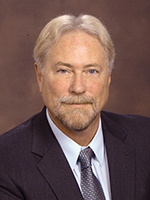 David R. Sibley received his BS in Biology from San Diego State University in 1977 and his PhD in Physiology and Pharmacology from the University of California, San Diego in 1982. He completed postdoctoral training at Duke University from 1982-1987 with Nobel Laureate Dr. Robert J. Lefkowitz. Sibley subsequently moved to the National Institute of Neurological Disorders and Stroke at the National Institutes of Health where he is currently Senior Investigator and Chief of the Section on Molecular Neuropharmacology.
David R. Sibley received his BS in Biology from San Diego State University in 1977 and his PhD in Physiology and Pharmacology from the University of California, San Diego in 1982. He completed postdoctoral training at Duke University from 1982-1987 with Nobel Laureate Dr. Robert J. Lefkowitz. Sibley subsequently moved to the National Institute of Neurological Disorders and Stroke at the National Institutes of Health where he is currently Senior Investigator and Chief of the Section on Molecular Neuropharmacology.
Dr. Sibley’s research has focused on characterizing the molecular properties of G protein-coupled receptors, particularly those for the neurotransmitter dopamine, and studying their role in neuronal signaling. His early research led to the discovery of novel GPCR subtypes, which currently represent important drug targets for the treatment of neuropsychiatric disease. More recently, he has applied novel pharmacological concepts, including allosterism and biased signaling, to identify and develop receptor modulators that exhibit greater subtype and/or signaling pathway selectivity. Sibley’s efforts have led to the discovery of allosteric ligands, biased agonists, and best-in-class selective agonists and antagonists of the D1, D2 or D3 dopamine receptor subtypes.
His research has resulted in over 250 articles and reviews related to receptor pharmacology and biochemistry, and he holds inventorship on 10 patents. Sibley has received numerous awards for his research at the NIH and was recently recognized as the 2018 outstanding alumnus of the UC San Diego Department of Pharmacology. Throughout his career, Dr. Sibley has enthusiastically trained and mentored dozens of postdoctoral fellows, graduate students, postbaccalaureate fellows and summer interns at the NIH.
Dr. Sibley has served as an Editor or board member of numerous scientific journals including Pharmacological Reviews, Molecular Pharmacology, Journal of Pharmacology and Experimental Therapeutics, Pharmacology and Therapeutics, Journal of Biological Chemistry, Neuropsychopharmacology, Neuropharmacology, and the Journal of Neurochemistry. He has also edited several books, including the Receptor Biochemistry and Methodology series, the Handbook of Contemporary Neuropharmacology, and Current Protocols in Neuroscience. Additionally, he served as the scientific website editor for the American College of Neuropsychopharmacology from 2007-2017.
He has been an active member of ASPET since 1988. He has served as secretary-treasurer and chair of the Neuropharmacology Division, chair of Julius Axelrod Award Committee and member of the Program, Nominating, and Astellas Award Committees. As secretary-treasurer of ASPET during 2008-2011, Dr. Sibley chaired the Finance Committee and served on the Investment Subcommittee. Following a six-year term as editor of Pharmacological Reviews and member of the Board of Publications Trustees, Dr. Sibley was elected to the ASPET Presidency in 2015 and served on ASPET Council until 2018. During his year as president, he led ASPET through a major strategic planning process resulting in a comprehensive strategic plan that touched on all areas and functions of the Society. Dr. Sibley is also a Fellow of the American College of Neuropsychopharmacology and a Fellow of the International College of Neuropsychopharmacology and has served as councilor and president of the International Catecholamine Society.
Paula H. Stern, PhD
 Paula H. Stern is a Professor Emeritus of Pharmacology at Northwestern University. She received her undergraduate degree from the University of Rochester, and graduate degrees in pharmacology from the University of Cincinnati (MS) and the University
of Michigan (PhD). She was a faculty member in the Department of Pharmacology at Northwestern University for more than 50 years. Dr. Stern has been a member of ASPET since 1969, serving on the ASPET Council (1988-1991), chairing the Committee on Women
(1983-1985), and serving as Associate Editor of Pharmacological Reviews (1982-1994) and Field Editor of the Journal for Pharmacology and Experimental Therapeutics (1981-1998).
Paula H. Stern is a Professor Emeritus of Pharmacology at Northwestern University. She received her undergraduate degree from the University of Rochester, and graduate degrees in pharmacology from the University of Cincinnati (MS) and the University
of Michigan (PhD). She was a faculty member in the Department of Pharmacology at Northwestern University for more than 50 years. Dr. Stern has been a member of ASPET since 1969, serving on the ASPET Council (1988-1991), chairing the Committee on Women
(1983-1985), and serving as Associate Editor of Pharmacological Reviews (1982-1994) and Field Editor of the Journal for Pharmacology and Experimental Therapeutics (1981-1998).
Dr. Stern’s research has focused on elucidating the endocrine pharmacology of bone. Many of her basic research findings have been applied to clinical questions, in collaborative studies with clinical investigators. Dr. Stern developed a highly sensitive
assay for the active metabolite of vitamin D that allowed for the elucidation of the mechanisms of hypercalcemias and vitamin D resistance syndromes and revealed age and race-associated differences in vitamin D metabolism. The assay also provided
a technique for structure-activity studies of vitamin D analogs on bone.
Her work on thyroid hormones revealed the roles of growth factors and inflammatory cytokines, respectively, in the effects of thyroid hormones to promote bone growth and to exacerbate osteoporotic bone loss. Her studies on parathyroid hormone signaling
in osteoblastic cells revealed a novel pathway through the heterotrimeric G protein Galpha12, phospholipase D and protein kinase C, leading to responses including increased interleukin-6 expression. She revealed effects of endothelins on bone, demonstrating
receptors and signaling pathways as well as actions on collagen synthesis and resorption. Additionally, she has made significant findings on skeletal effects of pharmacological agents including immunosuppressants, bisphosphonates and SERMs.
Her research has been recognized with the Outstanding Alumni Award of the Department of Pharmacology of the University of Michigan and the Louis V. Avioli Founders Award of the American Society for Bone and Mineral Research. Dr. Stern has taught pharmacology
courses to medical, dental, and graduate students and has mentored researchers from high school students through junior faculty. She received recognition for her teaching through the George H. Joost Outstanding Teacher Award and the Dean’s
Award for Teaching Excellence at Northwestern University. She has received the honor of having two annual awards carrying her name, the Paula H. Stern Achievement award, to a woman in the bone field, established by the American Society for Bone and
Mineral Research and the Paula H. Stern Award for Outstanding Women in Science and Medicine, established by the Department of Pharmacology and the Women Faculty Organization of Northwestern University, recognizing a woman faculty member for excellence
in research and teaching/mentoring.
Dr. Stern retired from Northwestern University in 2017 and undertook compiling a history of the Department of Pharmacology at Northwestern University. Her book, 16 Decades of Pharmacology: Evolution of an Academic Department, was published
by Northwestern University in December 2019.
Stephen F. Traynelis, PhD
 Stephen Traynelis received a BS in Chemistry (summa cum laude) from West Virginia University in 1984 and completed his graduate training on cellular mechanisms of seizure generation with Ray Dingledine in Pharmacology (supported by an NSF fellowship),
receiving his PhD from the University of North Carolina in 1988. In 1989 he joined Prof. Stuart Cull-Candy’s laboratory in the famed Department of Pharmacology at University College London as a postdoctoral fellow, and moved to La Jolla in 1992
to complete a second postdoctoral fellowship at the Salk Institute with Prof Stephen Heinemann. His postdoctoral research, supported by two NIH fellowships, focused on the biophysical basis for allosteric regulation of glutamate receptors, mechanisms
of excitatory synaptic transmission, and the molecular biology of the excitatory neurotransmitter receptors.
Stephen Traynelis received a BS in Chemistry (summa cum laude) from West Virginia University in 1984 and completed his graduate training on cellular mechanisms of seizure generation with Ray Dingledine in Pharmacology (supported by an NSF fellowship),
receiving his PhD from the University of North Carolina in 1988. In 1989 he joined Prof. Stuart Cull-Candy’s laboratory in the famed Department of Pharmacology at University College London as a postdoctoral fellow, and moved to La Jolla in 1992
to complete a second postdoctoral fellowship at the Salk Institute with Prof Stephen Heinemann. His postdoctoral research, supported by two NIH fellowships, focused on the biophysical basis for allosteric regulation of glutamate receptors, mechanisms
of excitatory synaptic transmission, and the molecular biology of the excitatory neurotransmitter receptors.
Dr. Traynelis joined the Department of Pharmacology at Emory University School of Medicine in Atlanta in 1994 and is currently a Professor of Pharmacology and Chemical Biology at Emory. He has made numerous seminal discoveries about the fundamental
properties of glutamate receptors. Most recently, he has developed multiple first-in-class subtype-selective NMDA receptor allosteric modulators with therapeutic potential for the treatment of ischemic brain injury, schizophrenia, Parkinson’s
Disease, epilepsy, and other disorders. He is a co-founder of NeurOp Inc, which has exploited these discoveries to develop neuroprotective agents, which are currently in clinical trials. Dr. Traynelis’ work to understand the functional consequences
of genetic variation in glutamate receptor genes (GRIN, GRIA, GRIK, GRID) in healthy individuals and neurological patients has provided new insights into receptor function and genetic risk factors. These efforts led to the founding of the Center for
Functional Evaluation of Rare Variants at Emory, which bridges the gap between genetic information and the functional and pharmacological consequences of variants, laying the groundwork for the evaluation of novel treatment paradigms. His research
program has received 26 years of uninterrupted funding from NINDS.
Dr Traynelis was President of the Atlanta Chapter of the Society for Neuroscience in 1997 and Chair of the MCDN4 NIH Study Section in 2005-6. In 2007 he received the first Distinguished Alumni Award from West Virginia University Chemistry Department.
He was elected an AAAS Fellow in 2014, served as Editor-in-Chief of in Molecular Pharmacology from 2012-16, and is a recipient of a NIH Javits Award and R35 Research Program Award. He is a co-author on over 200 peer-reviewed papers, book
chapters, and invited commentaries, has trained over 100 under graduates, graduate students, postdoctoral fellows, residents, and international students. Dr Traynelis is a co-inventor on 7 issued US patents. He has been a member of ASPET since 1997.
Mary Vore, PhD
 Mary Vore received her PhD in Pharmacology from Vanderbilt University in 1972, working in drug metabolism with Dr. Milton Bush, and furthered her commitment to drug metabolism during her postdoctoral work on cytochrome P450 with Dr. Anthony
Y. H. Lu.
Mary Vore received her PhD in Pharmacology from Vanderbilt University in 1972, working in drug metabolism with Dr. Milton Bush, and furthered her commitment to drug metabolism during her postdoctoral work on cytochrome P450 with Dr. Anthony
Y. H. Lu.
Dr. Vore served as assistant professor of Pharmacology and Toxicology at University of California, San Francisco School of Medicine, and in 1978, she and her husband, Dr. Edgar Iwamoto, joined the faculty in the Department of Pharmacology in the College
of Medicine at the University of Kentucky. There, Dr. Vore began her work to understand the mechanisms by which drug metabolites are excreted into bile. She discovered that pregnancy markedly decreased biliary excretion of organic anions such
as glucuronate conjugates, due to decreased protein expression of the ATP-Binding Cassette transporter, ABCC2/MRP2, and attributable to a decreased translation of ABCC2 mRNA to protein. She also discovered that expression of the hepatic sodium-dependent
taurocholate co-transporter, NTCP, was increased during lactation by a prolactin-induced, STAT5-mediated increased transcription of NTCP via the hepatic prolactin receptor. Throughout her career, Dr. Vore mentored 20 doctoral students,
seven postdoctoral scholars and many young faculty.
Dr. Vore published over 130 peer-reviewed primary research papers and was continuously funded by NIH from 1978-2016. She was promoted to professor of Pharmacology in 1986, then became the director of the Graduate Center for Toxicology (1994-2014),
and chair of the Department of Toxicology and Cancer Biology in the College of Medicine (2014-2016). She served as a member of the Pharmacology Study Section (1983 1987) and the Alcohol/Toxicology 4 Study Section (2000 – 2002) and as the
Chair (2002-2005; changed to the Xenobiotic and Nutrient Disposition and Action, XNDA, in 2004).
Dr. Vore was active in ASPET throughout, serving on the Executive Committee for the Division for Drug Metabolism (1977-1980), and as ASPET secretary-treasurer (1986-1988 and 2010-2012). She served as a member of the ASPET Board of Publications Trustees
(2006 – 2011), and later as chair of the Board of Publications Trustees (2014-2019). She served on the Editorial Board of Drug Metabolism and Disposition (1980-2011) and as associate editor of Molecular Pharmacology (2011-2013).
She has been a member of ASPET since 1975.
Scott A. Waldman, MD, PhD
 Scott Waldman obtained his PhD degree from Thomas Jefferson University, and his MD degree from Stanford University. He was a postdoctoral fellow at the University of Virginia and Stanford University in the Division of Clinical Pharmacology
in the laboratory of Ferid Murad, MD, PhD, who won the 1998 Noble Prize in Physiology or Medicine. He is the Samuel MV Hamilton Professor of Medicine, Director of the Gastrointestinal Cancer Program of the Kimmel Cancer Center, and Chairman of
the Department of Pharmacology and Experimental Therapeutics of Thomas Jefferson University.
Scott Waldman obtained his PhD degree from Thomas Jefferson University, and his MD degree from Stanford University. He was a postdoctoral fellow at the University of Virginia and Stanford University in the Division of Clinical Pharmacology
in the laboratory of Ferid Murad, MD, PhD, who won the 1998 Noble Prize in Physiology or Medicine. He is the Samuel MV Hamilton Professor of Medicine, Director of the Gastrointestinal Cancer Program of the Kimmel Cancer Center, and Chairman of
the Department of Pharmacology and Experimental Therapeutics of Thomas Jefferson University.
Dr. Waldman is a past member of the American Board of Clinical Pharmacology, a past Regent of the American College of Clinical Pharmacology (ACCP), a past-President of the American Society for Clinical Pharmacology and Therapeutics, and past Chair
of the Scientific Program Committee and Council Member of the American Society for Pharmacology and Experimental Therapeutics. He is a Fellow of the American College of Clinical Pharmacology (FCP), the American Heart Association (FAHA), and the
National Academy of Inventors (FNAI). He is the past Editor in Chief for Clinical Pharmacology and Therapeutics (2007-2019) and he is the current Editor in Chief for Cancer Biology and Therapy (2020-present).
He is the author of more than 100 patents and patent applications, and has established three biotechnology companies, all with diagnostic and therapeutic assets in clinical development. Dr. Waldman’s research, focusing on the development of
novel diagnostic, prevention, and therapeutic strategies for patients with gastrointestinal malignancies, obesity, and neurodegenerative diseases, has produced more than $50M in research funding and more than 300 peer-reviewed papers, with an
h index >70. Moreover, he has an abiding commitment to the development of the next generation of translational investigators. Thus, he is the founding director of the institutional programs for bench-to-bedside research training, including
the MD-PhD Program, the NIH-sponsored Postdoctoral Training Program in Clinical Pharmacology, and the Master’s Program in Human Investigation. In that context, he has had the privilege of mentoring more than 40 postdoctoral fellows and more
than 30 doctoral candidates in his laboratory.
Pancras C. Wong, PhD
 Pancras C. Wong is a Senior Research Fellow in Cardiovascular and Fibrosis Drug Discovery at Bristol-Myers Squibb Company. Dr. Wong received his BA degree in Chemistry from the University of Oregon - Eugene, Oregon, and PhD in Pharmacology from
the University of Minnesota - Minneapolis. Prior to joining Bristol-Myers Squibb in 2001, he started his pharmaceutical career at Hoechst-Roussell Pharmaceuticals and the DuPont Company.
Pancras C. Wong is a Senior Research Fellow in Cardiovascular and Fibrosis Drug Discovery at Bristol-Myers Squibb Company. Dr. Wong received his BA degree in Chemistry from the University of Oregon - Eugene, Oregon, and PhD in Pharmacology from
the University of Minnesota - Minneapolis. Prior to joining Bristol-Myers Squibb in 2001, he started his pharmaceutical career at Hoechst-Roussell Pharmaceuticals and the DuPont Company.
Dr. Wong has dedicated over 35 years to drug discovery research in the pharmaceutical industry and has co-discovered two blockbuster drugs, losartan (Cozaar®) and apixaban (Eliquis®). Losartan is the first-in-class of antihypertensive drugs
known as angiotensin II receptor blockers (ARB). Dr. Wong played an integral role in the discovery of receptor subtypes for angiotensin II, AT1 and AT2, and the identification of losartan as a selective AT1 receptor antagonist, which led to the
eventual cloning of the AT1 and AT2 angiotensin receptors. Apixaban is a factor Xa inhibitor. It is a direct oral anticoagulant with improved safety, efficacy, and ease of use compared with warfarin, the previous standard of care oral anticoagulant.
Apixaban has become the best-in-class direct oral anticoagulant and a new standard of care for the treatment of thrombotic disorders.
At Bristol-Myers Squibb, Dr. Wong continues his research on the next generation of antithrombotic agents, as demonstrated by the recent discoveries of PAR4 antagonists as potential antiplatelet agents and factor XIa inhibitors as potential anticoagulants.
He also conducts research on new heart failure therapies. Dr. Wong has authored over 180 papers. He was named an inventor in 17 patents and applications. The American Society for Information Science and Technology designated Dr. Wong in 2001 as
a Highly Cited Pharmacologist.
Dr. Wong is an elected Fellow of the American Heart Association (FAHA), a member of ASPET and the British Pharmacological Society. An ASPET member since 1990, Dr. Wong has served as an Executive Committee member of the Division for Drug Discovery
and Development, invited speaker at the ASPET Annual Meeting at EB 2002. He was also an Adjunct Professor of Pharmacology at the Temple University Medical School (2001-2003). Dr. Wong has received a number of prestigious awards, including the
American Chemical Society Team Innovation Award for the discovery of Cozaar (1997), the Ondetti & Cushman Award from Bristol-Myers Squibb (2011), the Robert R. Ruffolo Career Achievement Award in Pharmacology from ASPET (2013), the American
Chemical Society Heroes of Chemistry Award for the discovery of Eliquis (2015), the Sir James Black Award for Contributions to Drug Discovery of Eliquis from the British Pharmacological Society (2018).